|
January 20, 2018 - No. 2
Supplement
Discussion on
Economic Affairs
PDF
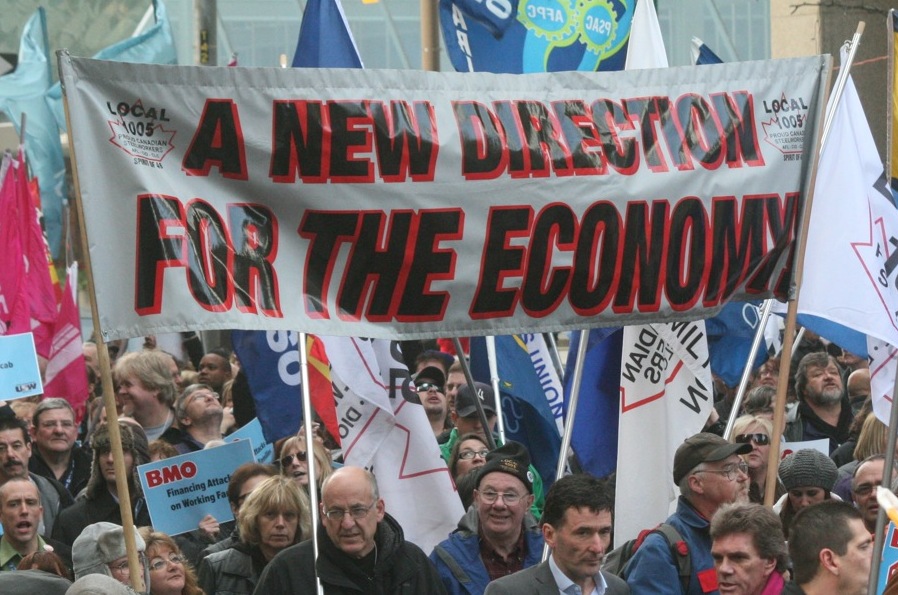
Workers
Need
an
Economy
that
Guarantees
the
Well-Being and Rights of All
• Davos Forum on the Economy
• Uneven
Economic Development within the
Imperialist System of States
• Reporting on the Deep Vein of
Poverty Running
Through the U.S.
• The Bitcoin Speculative Surge
Workers Need an Economy that Guarantees
the Well-Being and Rights of All
Davos Forum on the Economy
The 48th Annual Meeting of the World Economic Forum,
known
as the Davos Forum, takes place from January 23-26. The Forum
website says those attending range from "CEOs and industry
leaders to members of our communities," besides the usual
economists considered experts. This year "a record number of
heads of state, government and international organizations
alongside leaders from business, civil society, academia, the
arts and media" are participating. Donald Trump and Justin
Trudeau have confirmed they will be present as have French
President Emmanuel Macron, British Prime Minister Theresa May and
India's Narendra Modi. Modi will deliver the opening address and
Trump will deliver a keynote address before the close of the
meeting.[1]

The meeting is a concentrated expression of the rich and
their representatives gathering to describe the plight of the
poor and come up with schemes to attempt to escape the economic
laws of development, which they vainly hope to defy. Some will
wring their hands and talk passionately about the need to save
the middle class and, as Justin Trudeau now puts it, "those
aspiring to join the middle class" from becoming poorer as a
result of neo-liberal nation-wrecking, recurring economic crises,
war and the destruction of the productive powers worldwide.
In this vein, the Davos Forum website announces this
year's
meeting "aims to rededicate leaders from all walks of life to
developing a shared narrative to improve the state of the world."
A press statement says, "The programme, initiatives and projects
of the meeting are focused on the theme Creating a Shared
Future in a Fractured World." The promo for the meeting says
it "will focus on finding ways to reaffirm international
cooperation on crucial shared interests, such as international
security, the environment and the global economy. The meeting
comes at a time when geostrategic competition between states is
generally seen to be on the rise."
Using the words of Professor Klaus Schwab, Founder and
Executive Chairman, World Economic Forum, the press statement
further describes certain problems plaguing the rule of the rich
oligarchs:
"Alongside international cooperation, an additional
priority
of the meeting will be to overcome divisions within countries.
These have often been caused by breakdowns in the social contract
as a result of failure to protect societies from the
transformational impacts of a succession of shocks, from
globalization to the proliferation of social media and the birth
of the Fourth Industrial Revolution. Collectively, these shocks
have caused a loss of trust in institutions and damaged the
relationship between business and society.
"Our world has become fractured by increasing
competition
between nations and deep divides within societies. Yet the sheer
scale of the challenges our world faces makes concerted,
collaborative and integrated action more essential than ever. Our
Annual Meeting aims to overcome these fault lines by reasserting
shared interests among nations and securing multi-stakeholder
commitment to renewing social contracts through inclusive
growth."
The Missing Discussion at Davos
One thing the meeting will not discuss is the
aim of the
imperialists to guarantee the highest rate of profit possible for
themselves and their empires and how to satisfy this aim when the
general trend mostly coming from increased productivity is toward
a lower rate of profit. The unspoken solution to their problems
is to defy economic laws including through various pay-the-rich
schemes robbing the state treasuries to prop up certain private
interests, something which has become common practice, forcing
weaker countries to pay tribute to the centres of imperialism,
selective destruction of the productive forces, savage predatory
wars of aggression, blockades and sanctions resulting in the
depopulating of entire countries and regions forcing many
economies back to the stone age as one U.S. militarist famously
put it and by other means.
The Davos meeting will block any rational discussion on
the economy for the oligarchs have abandoned nation-building altogether
and replaced it with wrecking to feed the appetite of the private
interests which have formed cartels that vie for control. They will
discuss facilitating arrangements that attempt to defy gravity so
as to provide the highest rate of profit possible for the
dominant imperialists. They will not analyze and discuss exactly
what are the contradictions within a completely socialized modern
economy of industrial mass production still trapped and
controlled by narrow competing private interests, which
constantly burst forth in crises. They will do everything their
social wealth and state power can muster to stop the working
people from having any discussion amongst themselves of how to
move the economy forward to solve its internal contradictions and
give it a modern aim to guarantee the well-being and rights of
all.
Creating a Shared Future
The announced Davos theme for
their discussions is "Creating a Shared Future in a Fractured
World." The theme admits to a “fractured world” but only working
people are interested in analyzing and discussing the cause of the
fractures, resolving the contradictions and moving forward. The dream
of the rich is one of "creating a shared future" within the "fractured
world." It is irrational.
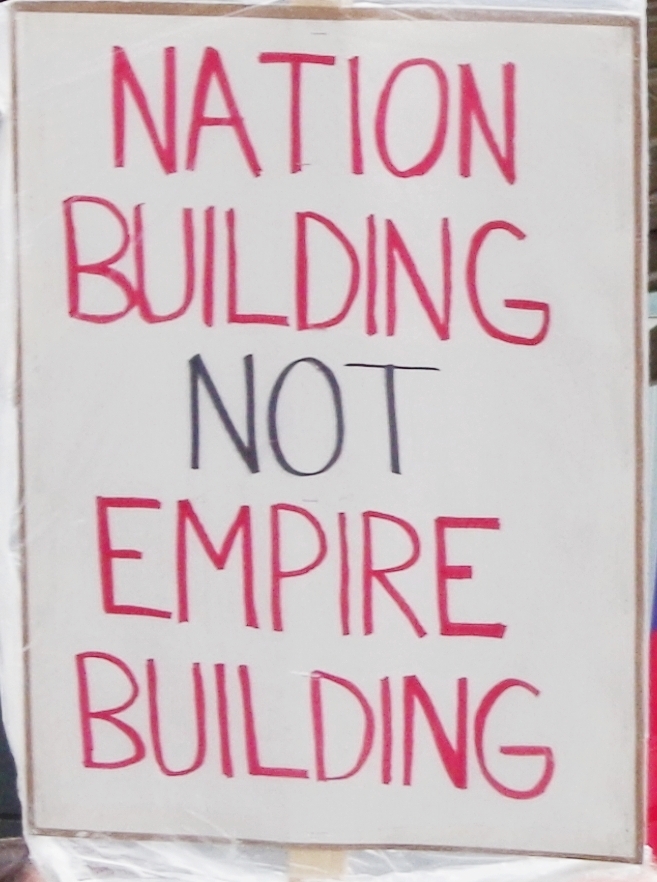 What "shared future" can
there possibly be within the
"fractured world" of empire-building and imperialist practices
within the overall aim of securing the highest possible profit
for competing private interests? Aside from fighting amongst
themselves, the most powerful imperialists openly attack
underdeveloped and super-exploited countries and workers on a
global scale. They even attack their own communities, regions and
sectors within the imperialist heartlands themselves. They are called
“rust belts” or "unable to compete" with new technologies or
"cheaper workers" found elsewhere. What "shared future" can
there possibly be within the
"fractured world" of empire-building and imperialist practices
within the overall aim of securing the highest possible profit
for competing private interests? Aside from fighting amongst
themselves, the most powerful imperialists openly attack
underdeveloped and super-exploited countries and workers on a
global scale. They even attack their own communities, regions and
sectors within the imperialist heartlands themselves. They are called
“rust belts” or "unable to compete" with new technologies or
"cheaper workers" found elsewhere.
Developing countries striving to be and even
communities and
entire regions within the imperialist economies are deprived of
the ability to build stable self-reliant centres within an
all-sided economy and culture. This forces inhabitants into
poverty and in some cases desperation and starvation driving them
to migrate to live in the large cities or abroad. Only
non-permanent resource centres are allowed in mostly small
communities and regions where the value workers produce from
resource extraction is ripped out and taken to the imperialist
centres in New York, London, Tokyo, Berlin, Paris and
Toronto.
The social wealth workers produce is no longer tied to
a nation but concentrated in the hands of imperialist cartels. They
strut around the world as all-powerful oligarchs dictating actions that
serve their narrow private interests, depriving peoples everywhere of
their own nation-building projects and right to be. They love to parade
their brilliance in defying the scientific
laws of economic development through meetings such as Davos and
in select universities, including Harvard, the school of
economic theory originating in Chicago, and the London School of
Economics.
Not much sharing goes on between oligopolies.
They are private interests that have taken over governments in
various places. They maraud around the world, using the state power
they control, which includes private militaries that organize coups
d’état and regime change where they are not in control, while
constantly fighting with competing oligarchs both at home and abroad.
This most certainly leads to both collusion and contention for power
and social wealth but not much "sharing."
To speak of "sharing" without sorting out and resolving
the
basic contradictions in the modern economy and how people relate
to one another within it is irrational. Not only irrational, it
seeks to cover up that what the people lack is political power to
settle scores with the aim of the imperialist system of states
and the control of the oligarchs. The old aim is consumed with
seizing the greatest amount of social wealth possible using any
means necessary. This includes employing the most powerful
imperialist militaries to rob the peoples of the world through
war, plunder and unequal trade. This means using the state
treasuries and pooled social wealth of the working class to pay
the empires of the rich. This means spreading parasitism, decay
and Ponzi-type schemes to claim money without producing and
realizing actual value that workers produce. The stock and
commodities exchanges and markets are centres of criminality
where the rich attempt to fleece their way to greater fortunes.
The recent Bitcoin craze is but one example of the next possible
financial disaster in the making.
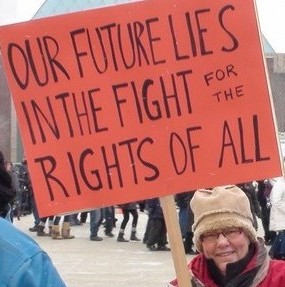 The working people should
not fall into a state of mind or
paralysis of bemoaning the current state of affairs as the fate
of humankind or become diverted into declaring the bogus theories
put forward by the rich and their representatives are not good
enough and should be improved. Those theories are simply devices
to fool the gullible into believing the oligarchs who rule can
somehow escape the scientific laws that govern the economy and
development of human society. The irrational theories reveal the
rulers as unfit to rule. The working people should
not fall into a state of mind or
paralysis of bemoaning the current state of affairs as the fate
of humankind or become diverted into declaring the bogus theories
put forward by the rich and their representatives are not good
enough and should be improved. Those theories are simply devices
to fool the gullible into believing the oligarchs who rule can
somehow escape the scientific laws that govern the economy and
development of human society. The irrational theories reveal the
rulers as unfit to rule.
The world is in constant change, development and motion
and
at this stage the working people are the essential human factor
in building the new. The central task of the working people is to
activate themselves and their social consciousness and develop
the solutions and necessary institutions to bring into being a
self-reliant all-sided economy with a modern aim that guarantees
the well-being and rights of all. They must establish their own
reference points and abandon once and for all the reference
points the imperialists give themselves and seek to impose on the
people.
Note
1. For information on the Davos
Forum participants and agenda, click
here.

Uneven Economic Development within the
Imperialist System of
States
The economies of most of the world's peoples are
becoming
more skewered towards serving the powerful centres of imperialism --
the U.S, Europe and Japan. The unevenness of
international trading relations appears in an October 12 report
from the United Nations Conference on Trade and Development
(UNCTAD).
The report details a growing dominance of a few raw
material
and agricultural exports within the economies of 91 countries
concentrated mostly in Africa and South America. This number
represents an increase of nine countries dependent on raw
material and agricultural exports in relation to their total
exports between 2010 and 2015 out of the 135 countries that
UNCTAD classifies as developing.
UNCTAD points out that dependence on raw material and
agricultural exports as a large percentage of exports usually
goes hand in hand with widespread poverty and other social ills
within a country. UNCTAD uses the term "commodity" to denote
unrefined or partially refined raw material and agricultural
commodities. Other commodities, such as manufactured goods are
referred to as merchandise.
In presenting the report "The State of Commodity
Dependence"
UNCTAD Secretary-General Mukhisa Kituyi said, "In the context of
dramatic volatility in commodity prices, developing countries
will struggle to achieve the Sustainable Development Goals unless
they break the chains of commodity dependence. Many developing
countries have been commodity-dependent for the past three
decades, and it is worrying to see that the numbers are going
up."
How do developing countries "break the chains of
commodity
dependence" without uniting in struggle to break the chains of
the U.S-led imperialist system of states? The UN's detachment
from exposing the root cause of these problems and indifference
towards proposing solutions reveal its subservience to
imperialism. In simply describing a global situation of one-sided
trade that favours the narrow interests of competing imperialist
forces without explaining why it exists and suggesting a way
forward towards trade for mutual benefit and development is
unhelpful to say the least.
For some reason unknown to UNCTAD, the Democratic
People's
Republic of Korea (DPRK) is a new entrant on the list. The report seems
oblivious to the fact that U.S. imperialism has subjected the
DPRK to a complete economic blockade and constant military
threats and provocations since the armistice ending the U.S.
military's open aggression in 1953 and its permanent occupation
of south Korea and brutal suppression of any movement towards
reunification of ancient Korea. With the collapse of the Soviet
Union in 1989, the economic blockade of the DPRK has intensified,
including a prohibition on using the international financial
system. This leaves the country with no viable trading options
except China, which is also being pressured to halt any trading
relations with the DPRK. Just last week, the U.S. President
imposed sanctions on several Chinese companies and individuals
for their economic relations with the DPRK.
The DPRK is not alone in suffering attacks from U.S.
imperialism. Cuba, Iran, Afghanistan, Iraq, Libya, Yemen, Syria,
Venezuela, and Zimbabwe are just a few on the list of 91 countries that
have been subjected to U.S.-led economic blockades, aggression, overt
and non-covert operations to bring about regime change and other
disruptive interference either directly or through paid mercenaries.
The UNCTAD report finds that the rise in dependence on
raw
material and agricultural exports within economies was most
noticeable in Africa, where seven new economies entered the
dependent category in 2014-2015, bringing the total to 46 on the
continent out of a total of 57. Again, this situation is
described without explanation and certainly without giving any
indication as to how to change the direction, which appears to be
worsening. The full list of countries is available in the report here.
Regarding the type of exports, the report says the
dependence
is predominantly on agricultural commodities. This was the case
for 41 per cent of the 91 countries, while 30 per cent depended on
fuel exports and 23 per cent on minerals, ores and metals.
UNCTAD defines a country as "commodity dependent" if
the raw
material and agricultural exports account for more than 60
per cent of its total exports in value terms. When this share
exceeds 80 per cent, the country is considered "strongly commodity
export dependent," which was the case for seventy per cent of the
91 "commodity-dependent developing economies" in 2014-2015.
The report contains 135 individual country profiles,
each
comprising 40 indicators mostly related to the dependence on
exports and imports of raw material and agricultural commodities.
The report includes a set of indicators that shows how dependence
on raw material and agricultural external trade to the exclusion
of all-sided development of trade and internal industrial and
consumer manufacturing, public services and social programs
"tends to negatively affect poverty alleviation and food
security" and puts downward pressure on "human development
indicators like life expectancy, education, and per capita
income."
The report does not include any mention or
encouragement of
the organized struggles of political forces around the world led
by their Communist Parties to defeat the global military,
political, economic and cultural control and annexation of their
countries within the U.S.-led imperialist system of states.

Reporting on the Deep Vein of Poverty
Running Through the
U.S.
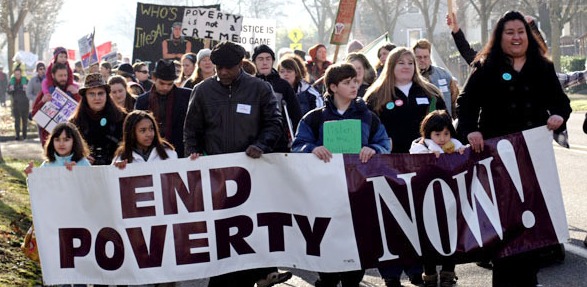
The Guardian newspaper in December published a
new
feature in which Professor Philip Alston, the United Nations'
special rapporteur on extreme poverty and human rights, leads Guardian
reporter Ed Pilkington "through some of
the most
impoverished communities in the country: in Los Angeles, San
Francisco, small towns in Alabama and West Virginia." The article
and photo essay, The Guardian notes, expose "the dark side
of the American Dream."
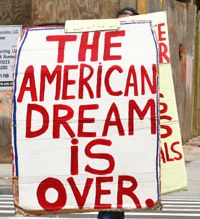 Pointing out that the United
States is one of the world's
wealthiest nations and nonetheless 41 million people are living
in poverty, The Guardian says
that Prof. Alston, wants to know
why. Pointing out that the United
States is one of the world's
wealthiest nations and nonetheless 41 million people are living
in poverty, The Guardian says
that Prof. Alston, wants to know
why.
"Alston's epic journey has taken him from coast to
coast,
deprivation to deprivation," The
Guardian's reporter Ed
Pilkington writes. "Starting in LA and San Francisco, sweeping
through the Deep South, traveling on to the colonial stain of
Puerto Rico then back to the stricken coal country of West
Virginia, he has explored the collateral damage of America's
reliance on private enterprise to the exclusion of public
help."
Pilkington notes that at the start of the fact-finding
tour
in Los Angeles, Republicans in Congress were voting for tax cuts
that "will exacerbate wealth inequality that is already the most
extreme in any industrialized nation." He also notes that of the
41 million people living in poverty in the U.S., "nine million
have zero cash income -- they do not receive a cent in
sustenance."
Alton's trip across the U.S. highlighted how race
factors into extreme poverty, as Pilkington writes during their
trip to Lowndes County in Alabama:
"The racial element of America's poverty crisis is seen
nowhere more clearly than in the Deep South, where the open
wounds of slavery continue to bleed. The UN special rapporteur
chose as his next stop the "Black Belt," the term that originally
referred to the rich dark soil that exists in a band across
Alabama but over time came to describe its majority African
American population.
"The link between soil type and demographics was not
coincidental. Cotton was found to thrive in this fertile land,
and that in turn spawned a trade in slaves to pick the crop.
Their descendants still live in the Black Belt, still mired in
poverty among the worst in the union.
"You can trace the history of America's shame, from
slave
times to the present day, in a set of simple graphs. The first
shows the cotton-friendly soil of the Black Belt, then the slave
population, followed by modern black residence and today's
extreme poverty -- they all occupy the exact same half-moon across
Alabama."
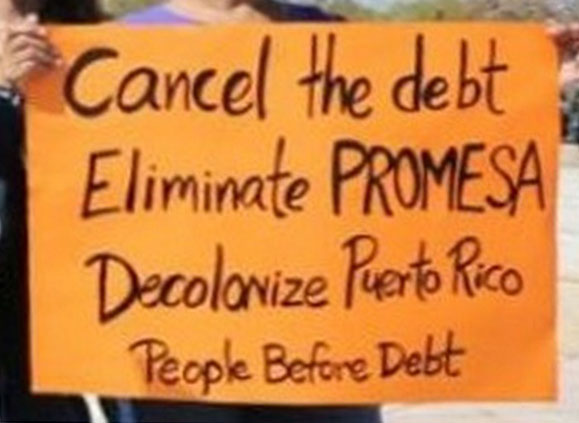 The two also travelled to
Guayama, Puerto Rico, three months
after Hurricane Maria devastated the island. But, as Pilkington
notes, "Puerto Rico's plight long predates Maria." The two also travelled to
Guayama, Puerto Rico, three months
after Hurricane Maria devastated the island. But, as Pilkington
notes, "Puerto Rico's plight long predates Maria."
"The island has twice the proportion of people in
poverty
(44 per cent) than the lowliest U.S. state, including Alabama (19 per
cent). And
that was before the hurricane, which some estimates suggest has
pushed the poverty rate up to 60 per cent," he writes.
Ultimately, Pilkington concludes, Alton hopes to shed
light
on the extreme poverty spread throughout this wealthy nation, a
problem unaddressed by Washington, D.C.
"Washington is very keen for me to point out the
poverty and
human rights failings in other countries. This time I'm in the
U.S.," Alston says. "What I see is the failure of society. I see a
society that let that happen, that is not doing what it should.
And it's very sad."
Alston's report became public on December 15. In it,
he lambasts the Trump administration for exacerbating the
homelessness crisis and argues that American democracy is
crumbling as a result of widespread poverty and homelessness. He
writes:
"The proposed tax reform package stakes out America's
bid to
become the most unequal society in the world, and will greatly
increase the already high levels of wealth and income inequality
between the richest one per cent and the poorest 50 per cent of
Americans. The
dramatic cuts in welfare, foreshadowed by the President and
Speaker Ryan, and already beginning to be implemented by the
administration, will essentially shred crucial dimensions of a
safety net that is already full of holes." [...]
"Successive administrations, including the present one,
have
determinedly rejected the idea that economic and social rights
are full-fledged human rights, despite their clear recognition
not only in key treaties that the U.S. has ratified (such as the
Convention on the Elimination of All Forms of Racial
Discrimination), and in the Universal Declaration of Human Rights
which the U.S. has long insisted other countries must respect. But
denial does not eliminate responsibility, nor does it negate
obligations. International human rights law recognizes a right to
education, a right to healthcare, a right to social protection
for those in need, and a right to an adequate standard of living.
In practice, the United States is alone among developed countries
in insisting that while human rights are of fundamental
importance, they do not include rights that guard against dying
of hunger, dying from a lack of access to affordable healthcare,
or growing up in a context of total deprivation." [...]
"I have been struck by the extent to which caricatured
narratives about the purported innate differences between rich
and poor have been sold to the electorate by some politicians and
media, and have been allowed to define the debate. The rich are
industrious, entrepreneurial, patriotic, and the drivers of
economic success. The poor are wasters, losers, and scammers. As
a result, money spent on welfare is money down the drain. To
complete the picture we are also told that the poor who want to
make it in America can easily do so: they really can achieve the
American dream if only they work hard enough.
"The reality that I have seen, however, is very
different. It
is a fact that many of the wealthiest citizens do not pay taxes
at the rates that others do, hoard much of their wealth
off-shore, and often make their profits purely from speculation
rather than contributing to the overall wealth of the American
community.
"There is no magic recipe for eliminating extreme
poverty,
and each level of government must make its own good faith
decisions," Alston writes. "But at the end of the day,
particularly in a rich country like the USA, the persistence of
extreme poverty is a political choice made by those in power.
With political will, it could readily be eliminated."

The Bitcoin Speculative Surge
The parasitism and decay within the economy is so
pronounced, pay-the-rich schemes and scams have become normal and
officially acceptable. In this regard, Bitcoin has begun trading
on the "legitimate" Chicago Board Options Exchange and the
Chicago Mercantile Exchange, giving it credibility, or so the
people are told.
The Bitcoin speculative surge reflects how degeneration
has
seeped into every pore of the imperialist economy. Those who buy
bitcoin to circumvent the stranglehold of the banks or U.S.
dollar, beware. The rich are quite happy and eager to seize
money-value without work or having any workers produce,
distribute or circulate actual commodities.
The work-time of the working class puts value in
commodities.
If the market price of a commodity goes greatly above the price
of production representing the value workers put into a commodity,
then value must come from other commodities through a reduction
of their market price or otherwise cause disruption in the
economy. This follows the basic economic law that what workers
have not produced cannot be consumed.
Bitcoin is said to be operating as a medium of
exchange.
Virtually any commodity can act as a medium of exchange if enough
people recognize it as such. That is not the issue with Bitcoin
or any of the other numerous digital currencies competing to be
used and traded.
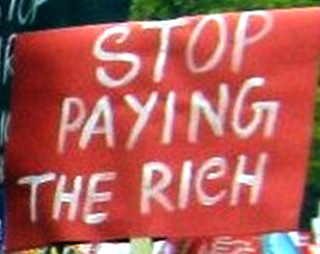 The problem stems from the
aim of the imperialist economy for
the highest possible profit on all transactions and to pay the
rich regardless of the social and economic consequences. The
imperialist aim has led to the current extreme concentration of
social wealth in the hands of a few. The economy has degenerated
into parasitism, decay and recurring crises throughout the world
rather than mobilizing the incredible productive powers of
industrial mass production to guarantee the well-being and rights
of all. The imperialist aim is consumed with empire-building and
waging endless predatory wars to dominate all humanity. The problem stems from the
aim of the imperialist economy for
the highest possible profit on all transactions and to pay the
rich regardless of the social and economic consequences. The
imperialist aim has led to the current extreme concentration of
social wealth in the hands of a few. The economy has degenerated
into parasitism, decay and recurring crises throughout the world
rather than mobilizing the incredible productive powers of
industrial mass production to guarantee the well-being and rights
of all. The imperialist aim is consumed with empire-building and
waging endless predatory wars to dominate all humanity.
Bitcoin and other digital currencies may act as means
of
exchange but for the rich the point is to use it to make money for
nothing, to push up its speculative value so that those who buy
it or created it in the beginning will become rich beyond their
wildest dreams. It represents a world gone mad with becoming rich
through speculation and war.
Bitcoin acts like a Ponzi pyramid scheme on digital
steroids.
As long as people continue to put money into a Ponzi scheme or
continue to buy Bitcoins at the price demanded, the scam will
persist. But Bitcoin's speculative value only exists if the
buying continues. As long as people are willing to buy it and a
certain hype around it remains then many people will believe in
the phenomenon because the imperialist outlook is pervasive. When
the buying stops for whatever reason, including state regulation
forced by a certain section of the rich who want to rein in the
competition for available realized value, and the faith begins to
fade, people will cash out, demanding the current inflated
speculative amount -- which no one will want to pay -- collapsing the
bubble.
The money-value will evaporate similar to a run on a
bank as
people pull out their money in panic. The actual amount in the
bank's vault is far less than the amount people are owed because
ten or a hundred times the total of their accounts has gone out
the door in loans that cannot be called back because the money
has been spent to be returned only little by little over
time.
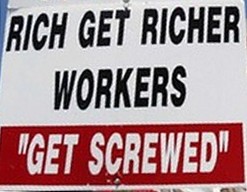 For imperialist schemes to
persist, they rely heavily
on hype
and acceptance of the outlook and aim of the economy for the
highest possible profit and to pay the rich. Official hype comes
in the form of state-sanctioned institutions such as the Chicago
exchanges and media promotion. For imperialist schemes to
persist, they rely heavily
on hype
and acceptance of the outlook and aim of the economy for the
highest possible profit and to pay the rich. Official hype comes
in the form of state-sanctioned institutions such as the Chicago
exchanges and media promotion.
The Bulgarian government announced recently that the
Bitcoins
it apparently bought a while back now hold enough speculative
money-value to pay down one-fifth of its national debt when
cashed out. It is a risky venture because the value a Bitcoin
represents when cashed out, if people are willing to buy them,
has to come from somewhere in the productive economy, a value
workers have produced through work-time transforming the natural
bounty of Mother Earth into the use-value of a good or service.
The Bitcoin speculative value may move from hand to hand as they
are bought and sold and new ones are "mined" but they cannot
increase the initial money-value that was put into them. Any
increase when cashed out and used to purchase commodities must
come from value workers have produced, thus decreasing or robbing
value from somewhere else in the economy. To repeat a well-known
fact: What workers have not produced cannot be consumed.

PREVIOUS
ISSUES | HOME
Website: www.cpcml.ca
Email: editor@cpcml.ca
|


 The working people should
not fall into a state of mind or
paralysis of bemoaning the current state of affairs as the fate
of humankind or become diverted into declaring the bogus theories
put forward by the rich and their representatives are not good
enough and should be improved. Those theories are simply devices
to fool the gullible into believing the oligarchs who rule can
somehow escape the scientific laws that govern the economy and
development of human society. The irrational theories reveal the
rulers as unfit to rule.
The working people should
not fall into a state of mind or
paralysis of bemoaning the current state of affairs as the fate
of humankind or become diverted into declaring the bogus theories
put forward by the rich and their representatives are not good
enough and should be improved. Those theories are simply devices
to fool the gullible into believing the oligarchs who rule can
somehow escape the scientific laws that govern the economy and
development of human society. The irrational theories reveal the
rulers as unfit to rule.

 Pointing out that the United
States is one of the world's
wealthiest nations and nonetheless 41 million people are living
in poverty,
Pointing out that the United
States is one of the world's
wealthiest nations and nonetheless 41 million people are living
in poverty,  The two also travelled to
Guayama, Puerto Rico, three months
after Hurricane Maria devastated the island. But, as Pilkington
notes, "Puerto Rico's plight long predates Maria."
The two also travelled to
Guayama, Puerto Rico, three months
after Hurricane Maria devastated the island. But, as Pilkington
notes, "Puerto Rico's plight long predates Maria." For imperialist schemes to
persist, they rely heavily
on hype
and acceptance of the outlook and aim of the economy for the
highest possible profit and to pay the rich. Official hype comes
in the form of state-sanctioned institutions such as the Chicago
exchanges and media promotion.
For imperialist schemes to
persist, they rely heavily
on hype
and acceptance of the outlook and aim of the economy for the
highest possible profit and to pay the rich. Official hype comes
in the form of state-sanctioned institutions such as the Chicago
exchanges and media promotion.